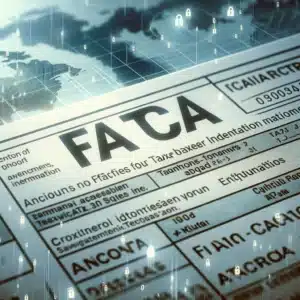Belgium’s data protection authority (DPA) has deemed the transfer of financial account data of “accidental Americans” to the US government, mandated by FATCA, as illegal under EU law.
This decision follows complaints under the General Data Protection Regulation (GDPR), arguing that the Foreign Account Tax Compliance Act reports exposed compliant bank account holders to disproportionate data protection and security risks.
If you want to invest as an expat or high-net-worth individual, which is what i specialize in, you can email me (advice@adamfayed.com) or use WhatsApp (+44-7393-450-837).
FATCA, officially in effect since 2014, requires non-US banks to report American clients’ bank accounts annually.
American expats in Europe contested this under GDPR, leading to complaints filed with the Belgian DPA, making Belgium the first EU member state to permit such challenges.
The DPA stated that the data processing, per the Belgian agreement, doesn’t align with GDPR principles.
It instructed the Belgian Federal Public Service Finance (FPS Finance) to cease transfers and notify the legislator of legal deficiencies.
Vincent Wellens, representing the complainants, noted the disproportionality of collecting data of US nationals living abroad, many of whom don’t owe taxes in the US.
FPS Finance defended its practice, citing a ‘standstill’ exception in the GDPR, but the DPA ruled it insufficient for the generalized processing of FATCA reports.
Hielke Hijmans, the chairman of the authority’s Litigation Chamber, emphasized the obligation to stop data flows not complying with the law, aligning with European Court of Justice rulings.
Filippo Noseda of Mishcon de Reya highlighted that the decision holds governments to GDPR obligations, urging other EU Member States to follow Belgium’s lead.
This article is not formal tax advice.

FATCA
What is FATCA?
Enacted in 2010 as part of the Hiring Incentives to Restore Employment (HIRE) Act, the Foreign Account Tax Compliance Act was signed into law by former President Barack Obama.
It aims to combat tax evasion by American individuals and businesses with foreign financial assets, requiring disclosure and reporting to the Internal Revenue Service (IRS).
FATCA Reporting
Involves the annual submission of Form 8938 by U.S. taxpayers with financial assets exceeding $50,000, encompassing bank accounts, stocks, bonds, and other instruments.
FATCA Exemption
Certain exemptions exist, such as assets held in a foreign branch of a U.S. institution or a U.S. branch of a foreign institution.

FATCA Form
Refers to Form 8938, a mandatory filing for American taxpayers, including those living abroad and meeting specified foreign financial asset thresholds.
FATCA Compliance
This means adherence to the reporting and disclosure requirements outlined by FATCA to ensure compliance with the law.
FATCA Withholding Tax
Failure to comply with FATCA reporting may result in a 30% tax penalty on withholdable payments, impacting foreign financial institutions.
Impact on Offshore Accounts
Belgium’s data protection authority’s ruling on FATCA’s financial data transfer raises data protection concerns for US offshore account holders.
If implemented in other EU countries, it could prompt a broader reassessment of the Act’s compliance with EU data protection regulations.

Key considerations of this ban include:
- Data Protection and Privacy Concerns
- Legal Challenges in the EU
- Review of Existing Agreements
- Impact on Reporting Agreements
- Broader Implications for FATCA
- Consideration of Alternatives
Filippo Noseda’s outreach may trigger legal challenges across the EU, impacting the automatic exchange of financial information.
Governments may need to review existing agreements, and reporting requirements for US offshore accounts might be re-evaluated in line with Belgium’s lead.
The situation highlights potential broader implications for the Foreign Account Tax Compliance Act in the EU, necessitating individuals and financial institutions to consider alternatives and stay informed about evolving regulations in their respective jurisdictions.
Pained by financial indecision?

Adam is an internationally recognised author on financial matters with over 830million answer views on Quora, a widely sold book on Amazon, and a contributor on Forbes.



